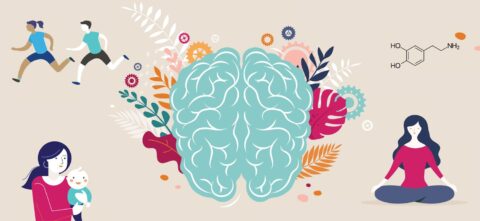If you’ve ever had a nervous tummy or felt butterflies, you’ve had an inkling of the fascinating connection between the gut and the brain. Sharon Stephenson finds out that scientists are learning more and more about how the state of your gut has far-reaching health consequences.
In the past few years, we’ve been bombarded with information about how important it is to have a healthy gut and how the foods we eat and our gut bacteria – the right sort and the right amount – can affect a person’s health. Our diets and the microbes in our gut, we’re told, can influence digestion, metabolism, appetite, allergies and immunity.
But new research shows the effects of a healthy gut may extend much further – all the way to the brain. Scientists are discovering the gut and the gut microbiome, as this bacterial ecosystem is called, may impact how people feel and think, our moods, anxiety, depression and other mental health issues.
Which is pretty revolutionary, given that Western medicine has traditionally treated the mind and body as separate entities. But recent findings have ushered in a new way of thinking about the gut-brain axis, a communication network that connects the gut and the brain. In its simplest terms, the gut-brain axis links the emotional and cognitive centres of the brain to the gut, with most of the communication starting in the gut.
According to scientist Dr Edward Walker, from Plant and Food Research in Auckland, these messages tell our body how to behave, influencing functions such as digestion, appetite control and immunity.
“For example, just before lunchtime your stomach sends a signal to your brain that increases your appetite to prepare you for a meal,” says Dr Walker. “Then after you’ve eaten, your small intestine sends a ‘stop eating’ signal to your brain to prevent you from overeating.”
It’s why the gut is often referred to as “the second brain”. Here’s how the gut-brain axis works: the gut has a dedicated nervous system along with a set of specialised sensory cells, a bit like gut taste buds, which work together to detect what’s in the gut and respond to that. These two systems send signals to the brain, mostly via the vagus nerve – one of our largest nerves – which relays information about the state of the body’s inner organs.
In the upper gut (stomach and small intestine) these signals are typically in response to the food you’ve eaten, while in the lower gut, these responses are normally to the gut bacteria present and the molecules these bacteria release. That’s why the gut-brain axis is affected by your diet as well as your gut microbiome.
Gut feelings
While scientists have known for years about the gut-brain axis, more recent research in mice has suggested the gut microbiome may contribute to our mood by affecting gut-brain signalling by the vagus nerve.
“Studies in mice have shown that gut-brain signalling and the gut microbiome can help to modulate the body’s stress response and play a role in cognition and mood,” says Dr Walker. “In one study, mice were reared in the laboratory to have no gut bacteria at all. When inoculated with gut bacteria from a human who suffered from stress, those mice also exhibited stress-type behaviours. In another recent study, it was shown that transplanting the gut bacteria of younger mice into the gut of older mice can reverse ageing-related cognitive declines.”
It’s a deeply complex body of work that scientists are only starting to unpick. It’s why clinical trials in humans seeking a link between gut health and mental health are, as yet, limited.
However, one US study in 2013 showed a promising link between the gut microbiome and mental health. Thirty-six healthy women were randomly divided into three groups: one group consumed probiotic yoghurt twice a day, a second group drank non-fermented milk products with no probiotics twice daily and the third group consumed no yoghurt or milk products at all. After a month, brain scans indicated that the women in the first group, who ate the probiotic-rich yoghurt, had less of a negative emotional response when shown images of people who were angry, sad or fearful than the other two groups.
Another study, published in the American Journal of Clinical Nutrition two years later, found that a diet high in refined carbohydrates was associated with an increased risk of depression in post-menopausal women, whereas a diet high in fibre from whole grains, vegetables and whole fruit was associated with a lower risk of depression.
What about diet?
As with most issues connected with health and wellness, all roads lead to diet.
Dr Pennie Taylor, research scientist and clinical dietitian at CSIRO, Australia’s national science agency, says more work needs to be done to understand the mechanisms involved in the microbiome-gut-brain axis before guidelines on what to eat to support our mental health can be developed.
“For now, the advice is to eat a balanced diet including wholegrains and plant foods, along with probiotic-rich foods such as kimchi, which can be beneficial,” says Dr Taylor, one of four scientists who recently published the CSIRO Gut Care Guide.
Fibre is another big player in this area, because fibre is basically the part of plant material in your food that is absorbed at different stages in the gut, depending on the type of fibre. It therefore passes through the digestive system, feeding the gut bacteria as it passes through. This is a key food source for your gut bacteria, so Dr Taylor says a diet rich in different types and sources of fibre will help to support a diverse microbiome.
“That includes a diet based on fresh fruit, vegetables and wholegrains. It could be as simple as choosing brown rice instead of white rice, having two servings of fruit and five or more servings of vegetables a day and increasing your intake of nuts and legumes.”
The recommended daily fibre intake is 28g per day for women and 38g per day for men and it’s no secret many Kiwis don’t reach these daily levels.
If you’ve seen advertisements for fermented vegetables, fibre supplements or probiotics and wondered about their efficacy, Dr Taylor says they can help, but aren’t necessarily a one-way ticket to good gut health.
“Good gut health doesn’t have to be expensive or tricky – stick to a balanced whole-food diet that includes plant-based foods, lean proteins and no added salts or sugars as much as possible and you may not need these other products.”
Holistic healers
Another key to maximising gut health doesn’t involve nutrition, but does involve more holistic factors such as managing stress, getting enough exercise and adequate sleep.
Poor sleep quality can affect our gut microbiome because it works in tune with our sleep/wake cycle, while it’s believed that exercise can benefit the gut via its positive effect on the immune system, and its ability to increase the motility of our gut – just like any muscle, movement helps keep it functioning at its best.
Stress is also known to slow down our gut motility, causing constipation and bloating.
Gut-brain science – what’s next?
Scientists around the world are currently making major inroads into further determining how the gut-brain axis works and how it can affect our health.
Evidence now shows a link between the gut-brain axis and Irritable Bowel Syndrome (IBS). It’s been found that in people with IBS, the sensitivity of the gut to pain is ramped up. A programme of hypnotherapy aimed at calming IBS symptoms can, it’s been found, be as effective as a low-FODMAP diet – the other gold-standard IBS treatment involving a sometimes restrictive diet – without having to change the way we eat. A Monash University study found targeted hypnotherapy, directed specifically at the gut, reduced symptoms such as abdominal pain, bloating and nausea in IBS sufferers by up to 72 percent. There are now apps that can guide patients through self-directed hypnotherapy.
New Zealand’s dairy industry has also been active in the gut-brain axis space, pioneering a project between Fonterra and Smarter Lives, funded by MBIE and led by AgResearch, to investigate how food influences brain function via the gut-brain axis. This study looks at how dairy ingredients can affect digestive health, brain performance and cognition in infants. And Dr Walker says Plant and Food Research spent eight years developing a plant-based appetite suppressant, which reduces hunger by targeting the gut-brain axis.
The next frontier in gut-brain axis research is the development of “psychobiotics” – treatments containing prebiotics and probiotics targeting the gut bacteria, for psychological disorders such as depression. This is emerging research – and much is not yet known – but it’s promising. A 2020 review found probiotics reduced depressive symptoms “in a statistically significant manner”. Scientists say more research is needed. But there could come a day when targeted probiotics may replace antidepressants.
Four science-based tips to nurture your gut-brain health
- Fibre: Whole grains, nuts, seeds, fruits and vegetables have healthy prebiotic fibre, which feeds the good bugs in our gut. There’s research to show some prebiotics can suppress our stress hormone, cortisol.
- Omega-3 Fats: These are found in oily fish and known to be useful for brain health. There’s evidence that omega-3s can boost the diversity of gut bacteria, and also reduce the risk of depression.
- Fermented foods: Yoghurt, kimchi, kefir, sauerkraut and kombucha have different kinds of gut-friendly probiotics. One study found women who took a fermented milk product showed more activity in the emotional control region of the brain. Not all fermented foods are equal, though; if it’s pasteurised it’s unlikely you’ll be getting much probiotic action.
- Antioxidant-rich foods: Flavanols, a type of antioxidant found in plants like cocoa, tea, olive oil and coffee, have been found to interact with gut bacteria and have positive effects on mood and cognition. It’s possibly a stretch to say science proves chocolate is good for our brain, but we reckon we can argue it’s good for our mood.








